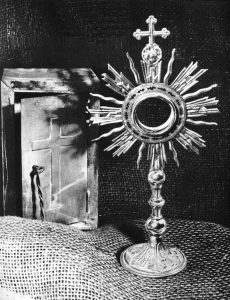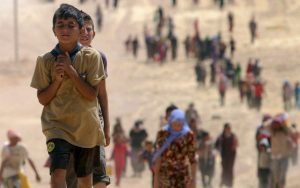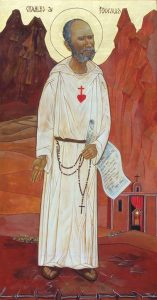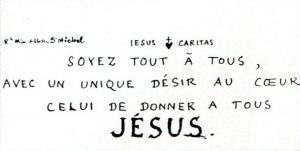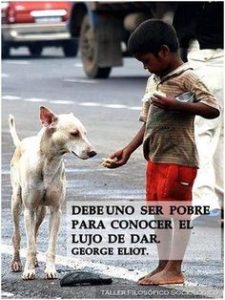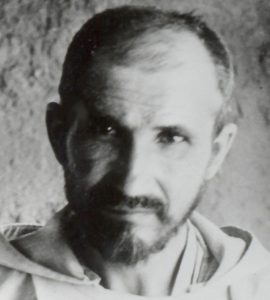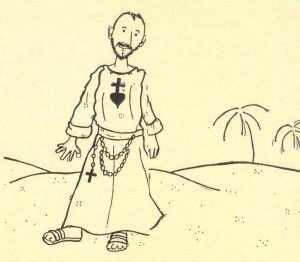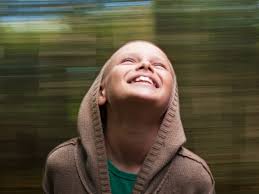“If Christ is not risen, our preaching is vain, your faith is also vain” (1 Cor 15:14)
When I made the decision to be one of those who would offer a few words in this Easter retreat, of this unique Easter in the midst of a pandemic, the first thing that arose in me was a question: what did Charles de Foucauld say about Jesus? risen? Is there any statement of yours, or any comment of yours, about the resurrection of Jesus? Actually, at first he had no answer, he was blank.
But, surely, Charles de Foucauld himself had to bear in mind that forceful affirmation of Paul, with which I wanted to begin this reflection: “If Christ was not risen, our preaching is vain, your faith is also vain.”
It must be remembered, first of all, that CdF is not a theologian. And, therefore, his objective in sharing his writings, letters, comments to the gospel … is not to propose an orderly and structured exposition of the faith. His is not a catechism of the Catholic faith, or a theology book. CdF is recording in writing what he discovers and deepening in his prayer, in his abandonment, and, also, in his incarnate life, close to those who do not know Jesus, and the poorest and most suffering .
On the other hand, at some point it may give the feeling that CdF has only stayed in Nazareth, ignoring the Passion, Death and Resurrection of Jesus. But it is not exactly that. He does not cut Jesus, keeping only the first part of his life, and discarding the public life and the finishing touch of him. CdF knows very well the entire public life of Jesus, especially his death and resurrection. Certainly, the redemptive cross of Jesus and the victory of the resurrection had to be part of his prayer and contemplation on many occasions. Without a doubt, he had to include the death of Jesus in this dynamic of descent from God. And the meditation on the resurrection of Jesus was able to confirm in CdF that, indeed, “if the grain of wheat falls to the ground and dies, it bears much fruit.” Although it does not express it in an explicit way and, much less, academic or theological, for CdF there is a unity and coherence between the hidden life of Jesus, and his public life, which culminates in his death and resurrection, and in which we participate in through the Holy Spirit (Pentecost).
“As soon as I understood that there was a God, I understood that I could not do anything other than live only for Him.” This phrase, at the beginning of his conversion and mission, makes us understand that he has discovered the God of the living and of life. She immediately goes to orient her spirituality towards Jesus, and him in Nazareth. Although without neglecting her total trust in God, as is reflected in the prayer of her abandonment. But her main gaze is going to be directed towards Jesus, in Nazareth. That Jesus is alive, he is not an idea or an ideology, or a theology, or a mere “story” (as so much is said now). He is a lively and very present person.
For Brother Charles, one of the strong presences of that living Jesus is the Eucharist: “The Eucharist is Jesus, it is all Jesus! In the holy Eucharist, you are all whole, all living my Well-Beloved Jesus. As fully as you were in the house of the Holy Family of Nazareth … as you were in the midst of your Apostles. ” (174 Meditation on the Gospel). The expression “all living” gives us to understand that, for Brother Charles, the Eucharist prolongs the presence of the risen Jesus. At another moment he affirms, remembering and commenting on the words of Jesus at the Last Supper: “<< This is my body… this is my blood… >> Mt. 26, 26-28. This infinite grace of the Holy Eucharist, how much it must make us love such a good God, a God so close to us… How much the Holy Eucharist must make us tender, good, for all men. ” (Meditation in 1897). He also puts words on the lips of Jesus, about the Eucharist: “Contemplate me lovingly: it is the only thing necessary and it is what I love the most … If you understood the happiness that there is in being at my feet and looking at me …” (Retrait in Nazareth. November 1897). In this other reflection he is even more explicit about the permanent presence of Jesus among us: “God, to save us, has come to us, he has mixed with us in the most familiar and close contact … For the salvation of our souls, he continues to come to us, mingling with us, living with us in the closest contact, every day and every hour in the Holy Eucharist… ”(Regulations and Directory, 1909).
All these quotes on the Eucharist and Eucharistic adoration speak to us of faith of a CdF convinced of the living presence of Jesus in the Blessed Sacrament. Not only that, but he understands his task, his mission, his presence among Muslims and those in need, from that living presence of Jesus in the Eucharist and in Eucharistic adoration. Without the profound experience of that Eucharistic presence, life is no longer an imitation of Nazareth, as CdF understands it. And on the positive side: contemplating and soaking up well that real presence of Jesus in the Eucharist pushes you, launches you into a personal presence in the world and among people as in Nazareth, in the style of Jesus.
The other strong presence of the risen Jesus, for Brother Charles, is the poor. There are many references to the poor in the writings of Brother Charles. I select some, of which we can intuit their faith in Jesus risen and present: “There is, I believe, no word of the Gospel that has had on my deepest impression, and has transformed my life more, than that:` Everything you do to one of these little ones, you do it to me. If we think that these words are those of the uncreated truth … With what force are we led to seek and love Jesus in these ‘little ones, these sinners, these poor people, putting all our spiritual means at the service of conversion, and all our means materials for the relief of temporary miseries ”. (Letter to Louis Massignon, April 1, 1916).
CdF does not make a theological reflection on the “presence” of the risen Jesus in the poor and the little ones, but it is evident that he has no doubt about the permanence of Jesus alive in them, and that this moves him. On the one hand, he perceives, he sees the risen Jesus in the last. On the other hand, he receives the call to bring that living Jesus closer to everyone, as can be seen from this other statement of his: “To be able to lead a very contemplative life, doing everything to everyone, to give Jesus to everyone” (June 1902, conclusion of the retirement). That is, he wants to see Jesus alive in the poor, and he wants others to see that Jesus alive, through him, through his witness.
I cannot resist recalling one of the best known Gospel texts on the presence of the risen Jesus: the disciples of Emmaus (Lk. 24, 13-34). We know the whole scene very well. I am going to stick only to the final moment, when the two pilgrims invite Jesus to stay with them, and Jesus accepts:
“And he went in to stay with them. And it happened that, when he was at the table with them, he took the bread, pronounced the blessing, broke it and gave it to them. Then their eyes were opened and they recognized him, but he disappeared from her side. They said to each other, “Wasn’t our hearts burning within us when he spoke to us on the road and explained the Scriptures to us?” And immediately getting up, they returned to Jerusalem and found the Eleven gathered and those who were with them, saying: “It is true! The Lord has risen and has appeared to Simon! They, for their part, told what had happened on the way and how they had met him in the breaking of bread. (Lk. 24, 29-34)
Interestingly, it is at the end, when Jesus is no longer physically present, that he seems to be most present. And that other presence, more interior, deeper, is what gives the disciples a new impulse. First, to remember all his journey in the key of Jesus (“Didn’t our hearts burn as he spoke to us along the way and explained the scriptures to us?”). Later, to join the other disciples to tell them what happened. Pablo d’Ors says, in an approach to this scene and, specifically, to this moment, that those of Emmaus have the freedom to interpret what has happened to them. And think and confirm what has happened to them. This is faith: not an imposition but a proposition, because it respects our freedom.
In a free reading of the life of CdF, in the light of this gospel of the disciples of Emmaus, we could say that, when CdF was, apparently, “back” from everything, the living God comes out to meet him to tell him to continue standing there in the midst of disappointments and falls. That living God had already made himself present, in some way, in the strong religious experience of the Muslims. The God of the living and of life uses different moments and people to meet us and become a companion on the journey. But it is in that church, in that conversation and confession with Father Huvelín, which was followed by the reception of the Body of Christ, when brother Charles “eyes were opened” and he was able to re-read his life from faith. We cannot stop listening, once again, to his memory of that moment when he was converted, that is to say, when he discovered new eyes: “As soon as I believed that there was a God, I understood that I could do nothing but live for him. My religious vocation dates from the same time as my faith. God is so great! There is so much difference between God and everything that he is not ”. His path, from that moment on, we know him.
The living God that he sees and senses in that initial moment, will shortly guide him and incarnate him in Jesus of Nazareth, and Jesus in Nazareth. We could say that his Emmaus throws him to Nazareth. His experience of his living translates her to everyday life, to the hidden life, to the simple and normal life. And as we have remembered in the first part of this presentation, you are going to keep this Jesus alive in the Eucharist and in the poor very much in mind.
For us too, as for CdF, this Easter can be an occasion to rediscover our “Emmaus in Nazareth”. In other words, the risen Jesus continues to be present in our daily lives and in the simple lives of the people we usually meet. In the simplicity of day to day, and in the simple and poor of each day, we can sense the gentle presence of the risen one. Or we can be ourselves, in our Nazareth, a simple instrument of the risen Jesus to make himself present and bring his new life closer to others.
Possible questions for personal reflection:
1. At what moments in my priestly life, perhaps of disappointment or pastoral disappointment, have I noticed the gentle presence of the risen Jesus?
2. How do I perceive the risen Jesus in everyday life, in my usual Nazareth? How can others perceive it through me?
3. Of all that I know of the life and spirituality of CdF, what stands out to me the most in relation to the risen one?
 Aquilino MARTÍNEZ, regional responsible
Aquilino MARTÍNEZ, regional responsible
(Translator’s note: thank you for your understanding and compassion)
PDF: The experience of the Risen in Charles de FOUCAULD, retrait Easter 2021, Aquilino MARTÍNEZ



